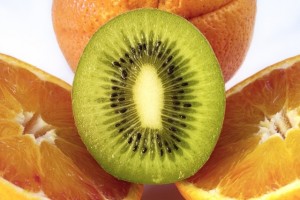 For many people, snacking has achieved ‘four letter word’ status as a diet buster. Parents tell their children: “No snacking before dinner!” Dieters tell themselves “No snacking, period!” But snacking isn’t a bad thing… it’s what (and how much) you snack on that matters.
For many people, snacking has achieved ‘four letter word’ status as a diet buster. Parents tell their children: “No snacking before dinner!” Dieters tell themselves “No snacking, period!” But snacking isn’t a bad thing… it’s what (and how much) you snack on that matters.
Problems with Snacking
In recent years snacking has become super-sized. Packaged foods, like a single serving bag of pretzels, actually have 2-3 servings. Snacks like these aren’t so harmless and can harbor half of your suggested sodium intake for a day. Sweet snacks like cinnamon rolls from vending machines have 460 calories, 22 grams of fat (two tablespoons of plain butter!), and 32 grams of sugar (about 15 teaspoons almost twice the daily limit). Snacking on foods devoid of nutrients and multiple servings is not the kind of snacking you want to do on a regular basis.
When Should You Snack?
Take into account, when you feel the need to snack, your body may be trying to tell you something. You may feel your stomach rumbling between meals or an emptiness. That’s your body’s way of saying “Hey, I’m running low on fuel!”. Don’t ignore that voice, but guide it in the right direction.
Sometimes you may feel like noshing on potato chips, not surprising as 56 percent of Americans surveyed felt crunchy foods left them feeling the most satisfied. Instead of downing chips alone and still feeling hungry, a snack like sugar snap peas dipped in hummus keeps you full, gives you important vitamins and minerals, and fulfills that need to snack on something crunchy.
According to the American Dietetics Association, snacks like these help adults meet their recommended vitamin and nutrient intake. If you really want chips, you should have them in a reasonable portion. Grab a handful and pair it with the veggies and hummus.
Research Supports Snacking, Even with Teens
Snacking between meals, especially that long time between lunch and dinner can be beneficial. It’s a chance to get healthy veggies and fruits (70 percent Americans don’t get the daily recommendations). It also helps people choose healthy, portion-controlled foods at their next meal because they aren’t ravenously hungry.
A new research study published in the Journal of the American Dietetic Association found that the rate of abdominal obesity was approximately 10 percent less in teens who snacked during the day compared to teens who never snacked. Say it with me – snacking is not bad!
(Image: Filomena Scalise/FreeDigitalPhotos.net)
